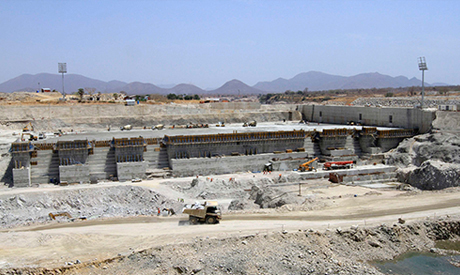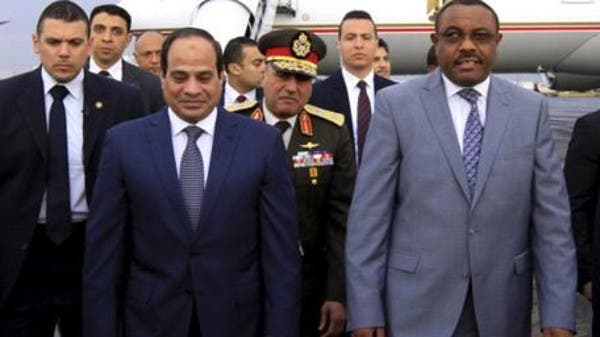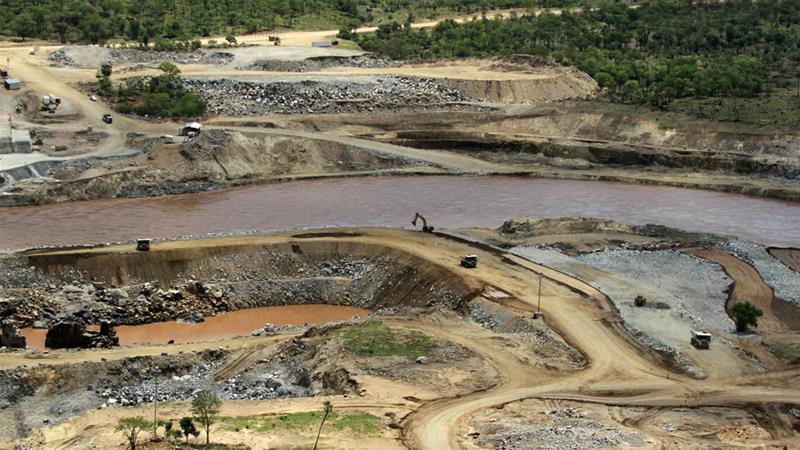In an important step towards resolving a long-running dispute over the Grand Renaissance Dam, the leaders of Egypt, Ethiopia and Sudan have signed in Khartoum a declaration of principles as follows
MENA and Ahram Online, Monday 23 Mar 2015

File photo: A general view shows construction activity on the Grand Renaissance dam in Guba Woreda, Benishangul Gumuz region March 16, 2014 (Photo: Reuters)
Ahram Online publishes a translated version of the "Declaration of Principles" signed by Egypt, Sudan and Ethiopia in a step to put an end to a four-year dispute over Nile water sharing arrangements among Nile Basin countries. Ten principles are outlined in the document signed by the three countries.
Introduction
Valuing the increasing need of the Arab Republic of Egypt, the Federal Democratic Republic of Ethiopia and the Republic of the Sudan for their over-border water sources, and realising the importance of the Nile River as a source of life and a vital source for the development of the people of Egypt, Ethiopia and Sudan, the three countries have committed themselves to the following principles concerning the Grand Ethiopian Renaissance Dam:
1. Principle of cooperation:
- Cooperation based on mutual understanding, common interest, good intentions, benefits for all, and the principles of international law.
- Cooperation in understanding the water needs of upstream and downstream countries across all their lands.
2. Principle of development, regional integration and sustainability:
The purpose of the Renaissance Dam is to generate power, contribute to economic development, promote cooperation beyond borders, and regional integration through generating clean sustainable energy that can be relied on.
3. Principle of not causing significant damage:
- The three countries will take all the necessary procedures to avoid causing significant damage while using the Blue Nile (the Nile's main river).
- In spite of that, in case significant damage is caused to one of these countries, the country causing the damage [...], in the absence of an agreement over that [damaging] action, [is to take] all the necessary procedures to alleviate this damage, and discuss compensation whenever convenient.
4. Principle of fair and appropriate use:
- The three countries will use their common water sources in their provinces in a fair and appropriate manner.
- To ensure fair and appropriate use, the three countries will take into consideration all guiding elements mentioned below:
a. The geographic, the geographic aquatic, the aquatic, the climatical, environmental elements, and the rest of all natural elements.
b. Social and economic needs for the concerned Nile Basin countries.
c. The residents who depend on water sources in each of the Nile Basin countries.
d. The effects of using or the uses of water sources in one of the Nile Basin countries on another Nile Basin country.
e. The current and possible uses of water sources.
f. Elements of preserving, protecting, [and] developing [water sources] and the economics of water sources, and the cost of the procedures taken in this regard.
g. The extent of the availability of alternatives with a comparable value for a planned or a specific use.
h. The extent of contribution from each of the Nile Basin countries in the Nile River system.
i. The extent of the percentage of the Nile Basin's space within the territories of each Nile Basin country.
5. The principle of the dam's storage reservoir first filling, and dam operation policies:
- To apply the recommendations of the international technical experts committee and the results of the final report of the Tripartite National Technical Committee during different stages of the dam project.
- The three countries should cooperate to use the final findings in the studies recommended by the Tripartite National Technical Committee and international technical experts in order to reach:
a. An agreement on the guidelines for different scenarios of the first filling of the Grand Ethiopian Renaissance Dam reservoir in parallel with the construction of the dam.
b. An agreement on the guidelines and annual operation policies of the Renaissance Dam, which the owners can adjust from time to time.
c. To inform downstream countries, Egypt and Sudan, on any urgent circumstances that would call for a change in the operations of the dam, in order to ensure coordination with downstream countries' water reservoirs.
- Accordingly the three countries are to establish a proper mechanism through their ministries of water and irrigation.
- The timeframe for such points mentioned above is 15 months from the start of preparing two studies about the dam by the international technical committee.
6. The principle of building trust:
- Downstream countries will be given priority to purchase energy generated by the Grand Ethiopian Renaissance Dam.
7. The principle of exchange of information and data:
- Egypt, Ethiopia and Sudan will provide the information and data required to conduct the studies of the national experts committees from the three countries in the proper time.
8. The principle of dam security:
- The three countries appreciate all efforts made by Ethiopia up until now to implement the recommendations of the international experts committee regarding the safety of the dam.
- Ethiopia will continue in good will to implement all recommendations related to the dam's security in the reports of the international technical experts.
9. The principle of the sovereignty, unity and territorial integrity of the State:
The three countries cooperate on the basis of equal sovereignty, unity and territorial integrity of the state, mutual benefit and good will, in order to reach the better use and protection of the River Nile.
10. The principle of the peaceful settlement of disputes:
The three countries commit to settle any dispute resulting from the interpretation or application of the declaration of principles through talks or negotiations based on the good will principle. If the parties involved do not succeed in solving the dispute through talks or negotiations, they can ask for mediation or refer the matter to their heads of states or prime ministers.




